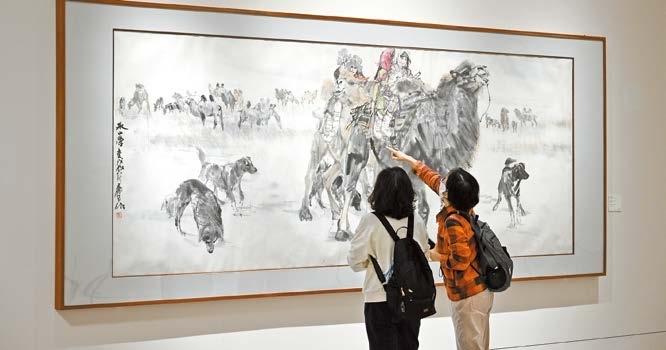
THIS year marks the 100th anniversary of the birth of Huang Zhou (1925-1997), one of China’s most revered modern masters of art. To commemorate this significant milestone, a retrospective exhibition is being held at the Guangdong Art Museum (new venue) until June 15. “Centennial Reflections: Huang Zhou’s Poetic Dialogue with Life” offers a comprehensive review of Huang’s remarkable artistic journey, showcasing 100 of his finest works alongside a rich array of historical photographs and archival video materials. It aims to provide visitors with an in-depth exploration of the profound impact Huang had on the development of Chinese modern art. Huang’s works were often characterized by quick sketches and bold, expressive brushstrokes. At the core of his artistic style was realism, with a focus on capturing the vivid details of everyday life, while infusing them with a deep sense of patriotism. The show is divided into six thematic sections. The “Manhood and Ambition” section focuses on the early years of Huang’s artistic journey, reflecting the formative period of his creative output. A tribute to his military service, the “Military Life and Frontier” section features his most iconic works inspired by his time in China’s frontier regions, particularly Xinjiang and Xizang. “Admiration for the Past and Free Spirit” delves into Huang’s study of traditional Chinese art and his innovative reinterpretation of classical elements in his own distinct style; while the “Cultural Ambassador and Bridge” section celebrates the artist as a bridge between East and West. The “Southern Waters and Water Towns” section explores the connection between Huang’s work and the distinctive culture of the Lingnan region, featuring pieces inspired by themes from the southern coastal landscapes and waterways. “Career and Legacy” is centered around the construction of the Yanhuang Art Museum, showcasing Huang’s significant contributions to the development of China’s public art sector. Dates: Until July 15 Venue: Guangdong Art Museum (Bai’etan), Liwan District, Guangzhou (广东美术馆新馆)(Tang Li) | 
